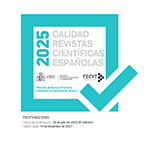Counterknowledge and Credulity Pandemics in Network Society: the Role of Journalism in Search of Truth in Digital Environment
Abstract
Internet has modified in deep the traditional relationship between academic knowledge and public opinion. It has developed the cybergossip: a word which means everybody can write what ever they want in the web even without an academic approach. Many of the gossips that go round the web are harmless, such as Elizabeth the Queen is an alien or Elvis Presley is still alive. However, the gossips with a scientific background are harmful because the scientific credibility acts as guarantor of the gossip. This is defined as counterknowledge, an emerging trend in network society. The online public opinion believes in them. This article analyzes some “case study” of this type of gossip. Sometimes theses cybergossips could be more valuable in terms of effectiveness to persuade populationthan the real expertise messages spread out by university professors and their webs. This article analyzes some controversial case studies, such as vaccine and A Flu or the relationships between cancer and mobiles, among others. We study which information we can obtain if use different paths for finding it such as Goolgeweb, Goolgeblog and Youtube. We can detect some differences among them. Nevertheless we can generalize that there is much more information about pseudoscience than proper science itself. We point out which parameters are interesting for getting a good position in the web. We recommend that universities should use web techniques as videos in Youtube or lecture’s blogs for disseminate the scientific thoughts and the academic approach among the online public opinion. Academician should counteract the pseudoscientific approach which is dominant in the web.Downloads
Article download
License
In order to support the global exchange of knowledge, the journal Estudios sobre el Mensaje Periodístico is allowing unrestricted access to its content as from its publication in this electronic edition, and as such it is an open-access journal. The originals published in this journal are the property of the Complutense University of Madrid and any reproduction thereof in full or in part must cite the source. All content is distributed under a Creative Commons Attribution 4.0 use and distribution licence (CC BY 4.0). This circumstance must be expressly stated in these terms where necessary. You can view the summary and the complete legal text of the licence.










